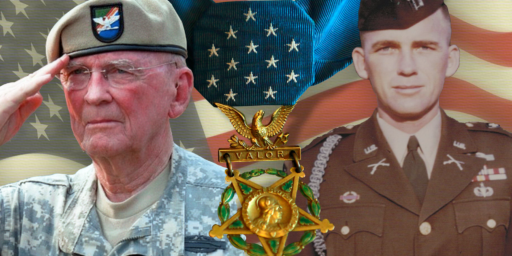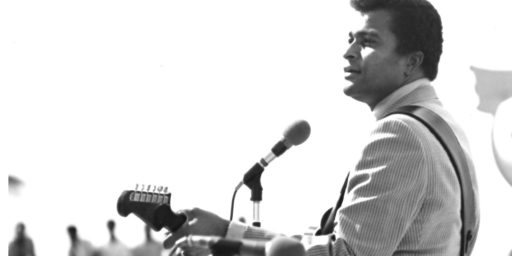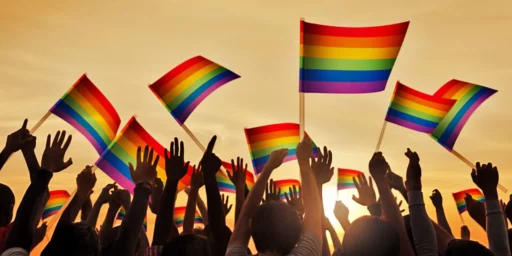“Politicizing” Sports
A reminder that all choices are political to one degree or the other.

Ok, so part of me feels like I should just have moved on after reading this opinion piece in The Washington Examiner, Democrats must stop politicizing sports. For one thing, the author is a summer intern, which means this is probably one of his first published pieces and I feel a tad guilty for being harsh in my criticism. And, moreover, it is just a minor topic (well, at first blush it is, but it really hits some big issues). However, it hit several notes that got my attention. First, I like sports and second, I find that the term “politicize” is frequently misused. Hence, the headline itself drew me in. Then the piece itself makes a number of other claims/assertions that stoked my blogging gene.
The piece is an attempted contrast of how the Los Angeles Dodgers and the Texas Rangers are dealing with Pride month-related topics:
Today, athletes are forced to enter the political fray because of the way Democrats have politicized sports. While the Los Angeles Dodgers celebrated Pride Night by honoring anti-religion drag queens who mock God and faith, the Texas Rangers are facing widespread criticism for being the only Major League Baseball (MLB) team that does not host Pride Nights.
[…]
The Texas Rangers are playing it smart by catering to the personal and political opinions of all their fans and preventing a controversy from stirring. At the same time, they are also maintaining the essence, purpose, and spirit of sports by refusing to get involved in political stunts, unlike the other 29 MLB teams.
First and foremost, all of this is politics and the Rangers choosing to not participate in Pride Night is a political decision as much as the Dodgers’ decision to do as they have done. Part of that is, no doubt, about the politics of the state of Texas, but it is more likely about the politics of the ownership and management of the team. It is a frequent error made, especially in conservative circles, to state that lack of action is somehow apolitical. Or, more to the point, to identify “doing the thing that I like” with “not being political.”
To that point, let me highlight “The Texas Rangers are playing it smart by catering to the personal and political opinions of all their fans and preventing a controversy from stirring” (emphasis mine). So, from the essay’s POV, all the fans in Texas don’t want Pride Night. This is, of course, demonstrably not true, but it directly speaks to my point that the author is defining being “political” as avoiding talking about something that he doesn’t like. It is a sleight of hand that attempts to define any attempt at dealing with including new points of view as the disruptive force while giving a pass to anyone who stands in the way of change. It is a claim that the status quo ante is the valid state of being (and therefore not “political”) while it is the agents of change that are steeped in “politics” (which, I would note, is given a thoroughly negative connotation).
Further, the notion that sports aren’t/shouldn’t be political is simply absurd as a general matter, insofar as sports are embedded in the broader culture and the broader culture is influenced by politics. The fact that June is Pride Month and that many businesses engage in Pride-based marketing is a result of broader socio-political forces, as is the fact that we are seeing a backlash to Pride activities is also political. The MLB is just operating within this context. And the fact that there are Pride Nights in 2023 but there wasn’t any such thing in 1973 is a sign of the shifting culture, not the radical choices of the MLB.
The fact that so many businesses now engage in some level of Pride Month marketing is a sign of the broader social acceptance of LBGTQ+ individuals. Corporations are not known for cutting-edge activism and indeed are incentivized not to engage in activities that will rile their customers. Indeed, if anyone s behaving “politically” the way the column seems to define the term (as in bucking social trends to appease one’s in-group), then it is the Rangers organization so behaving, not the other 29 teams.
Further, and probably the thing that set me down the path of blogging on this piece was the intro:
Gone is the time when Michael Jordan confidently asserted, “Republicans buy sneakers, too.” Today, athletes are forced to enter the political fray because of the way Democrats have politicized sports.
Well, again, not only was that a political choice made by Jordan (it is not an apolitical stance, as it is rather actively acknowledging politics as a reason to behave a certain way–and, really, making a political statement that he, himself, was not very political), but it is not as much emblematic as suggested.
Off the top of my head, the following examples of sports being connected to politics come to mind (and note that not all of these are liberal political actions):
- Jesse Owens at the Berlin Olympics
- Jackie Robinson
- Mohammed Ali
- The 1968 Olympics and the Black Power Salute
- Singing the National Anthem at ballgames
- Military flyovers
- Military appreciation month in the NFL
- Cancer awareness month in the NFL
Indeed, the entire issue of Black athletes competing in college and pro sports was political to its core. I have no doubt that during the period of the desegregation of sports, a lot of people were bemoaning how sports had become “political” and why couldn’t they just play the damn games.
The notion that sports has been a politics-free zone until Democrats came in and messed it all up is a myth. And in contrast with the Jordan example, I can think of political statements made by LeBron James, Steve Kerr, and Greg Popovitch in recent years. There is a whole side conversation to be had about kneeling at NFL games (which the author does mention)–to include both sides of that issue (with the more “conservative” position winning the day, I would add). Not to mention there is also the whole issue of team names and mascots–no politics there, no sir.*
The conclusion of the piece tries to make the case that the author is concerned about the corrosive effect of politics on sports:
It makes fans resent their teams.
[…]
Athletes must do more to come together and fight against the politicization of sports. The bureaucracy and backlash accompanying this phenomenon negatively affect both athletes and fans. There is no reason for the woke agenda to polarize sports any further than what is considered healthy sports rivalry.
On the one hand, I am sure some fans are upset by these things. (And I will ignore all the silly, cliched usage of “woke” in all of this because this post is already a lot longer than I intended). On the other, the piece made me wonder where the Dodgers ranked in terms of attendance this season.
Care to guess?
It is a number between 1 and 30.
Got it?
Well, according to ESPN, the team with the number one overall average attendance is, wait for it, the LA Dodgers. More specifically, they are number one at home and number two on the road (beaten only by the Yankees). The Rangers (which is my team, BTW), are 14th at home and 18th overall. FWIW, the Dodgers have the second largest stadium in terms of seating capacity and the Rangers have the 22nd. Of course, that isn’t everything, insofar as the Oakland A’s have the most seating capacity and currently are 30th in home attendance (and 30th overall).
Side note: the Dodgers aren’t even in first place in their division (Texas is having one of their best seasons in years).
At any rate, I think that there are real issues here. The first is simply the idea that sports or pop culture broadly, isn’t going to be influenced by politics is a profound misunderstanding of what politics is. There is, to put it bluntly, no escape from politics. And pop culture is, as the term denotes, linked to the culture, which includes politics.
The second point, which I think is both pretty obvious when you think about it, but also ignored by a lot (most, really) people is that even what is considered “normal” or apolitical is drenched in power politics–it is just that the politics in question are the dominant ones so its seems like it isn’t a choice. This is why these changes affect people who are conservative the hardest. The nature of conservative politics is the preservation of existing power structures. So when things change, this definitely rankles conservatives.
This is especially true when a dominant group (e.g., whites, males, Christians, heterosexuals, etc.) is asked to give ground to a group that has had less power or focus. You know, like white folks who get upset about Black History Month or, well, Pride Month. Or, the notion that acknowledging same-sex partners in an elementary school is sexualizing without realizing that so is a mention of traditional marriage, but since traditional marriage is “normal” that it doesn’t count. (Just consider what happens anytime a previously white character from pop culture is recast as being a person of color).
At a minimum, this kind of piece is instructive in terms of thinking about the ongoing tensions in a pluralistic society wherein the small-c conservative forces will frequently claim that any attempt to expand inclusion (broadly defined) is a political attack on the status quo without acknowledging (or even always understanding) that maintaining the status quo is also inherently a political choice.
Politics is, at its core, about the power relationships between citizens and so maintaining or shifting those power relationships is political.
(And I have thought of more and more examples of how politics has suffused sports for decades, but sometimes it is just time to quit).
*And look, it is not just about liberal reaction to race-based names. The very fact that that “Redskins” was once acceptable is steeped heavily in American mythology and politics about westward expansion. The University of Mississippi’s usage of “Colonel Reb” and calling the university “Ole Miss” had political connotations linked to the Civil War and Reconstruction. Indeed, the usage of “Rebels” as a mascot in southern schools is political, and not in a liberal sense. The usage of “Patriot” as a mascot is political, and one is not really liberal or conservative.






100% to all of this. And to extend it further, the intermingling of politics and sports isn’t a remotely recent thing. In fact, for all of recorded world history sports have always had a cultural and political component to them. And that isn’t unique to the Western World (though it can be easily argued that factors like colonization definitely brought new political meaning to sports).
And honestly, as with most of these issues, it isn’t the politicization of sports that people are upset with (for example I’m sure the author is all for the singing of the National Anthem at sporting events, which began in the wake of WW1 and whose adoption was accelerated during WW2). It’s politics that they author doesn’t like that are the issue (as they always are).
Well written and I agree with you. That said, I’m going to go off on a tangent because I almost laughed out loud when I read this quote from the article:
You have to cut off a hell of a lot of stunts involving all kinds of things before you can narrow it down to just political stunts. Has the author ever been to a baseball game? There are 81 home games, each 3-4 hours long. It is one long stretch of stunts, one after the other, multiple in a night and all day long before and after the games. I just got a pitch for cheap tickets to celebrate Gunnar Henderson’s birthday, because of course everyone was looking for a way to celebrate this talented rookies special day, as one does. Every game finds at least one group feted: teachers, veterans, Little Leaguers, valedictorians, UM Alumni, the list goes on and on and on. Every single home game finds each home town batter coming to the plate to a snatch of a specially chosen song, our closer coming to the mound with a partial reenactment of a scene from The Wire, an audience participation of singing and dancing to “Thank God I’m a Country Boy”, wild cheers to an animated “race” around the bases between anthropomorphic hot dogs labeled, “Ketchup”, “Mustard” and “Relish” (my wife is a loyal Relish fan) and, well, the list goes on and on and on. If the marketing department finds a group with ten members and a name, they will give them a night at the ballpark.
@MarkedMan: An excellent addendum.
If you go with the sociological theory that organized sport is functionally a ritualized replacement for combat, you could argue that per Clauswitz, “[sport] is just politics by other means”
I agree 99.5%, but just feel the need for a nitpick:
Traditional marriage is an entirely sexless affair where any children are delivered by a large waterfowl from parts unknown.
(We really should be tracking the storks back to their nests — I suspect they are either kidnapping children, or have an imprisoned breeder population of humans)
@MarkedMan:
OBTW, if you’re in Houston on the 28th July:
Episcopal Night at the Ballpark: Houston Astros vs. Tampa Bay Rays
Friday, July 28, 2023, 5:00 PM – 11:00 PM
Location: Minute Maid Park – 501 Crawford St, Houston, TX 77002
Cost: $23 – $60
PURCHASE YOUR TICKETS HERE
COMPRE SUS ENTRADAS AQUÍ
Portion of Proceeds Will Benefit Lord of the Streets
To learn more about Lord of the Streets, click here.
@Gustopher: I stand corrected 😉
@Scott:
But see that’s political. Why do Episcopalians get a night but not Unitarians or Quakers?
Now I resent the Washington Examiner.
I am not surprised to find STL has the #3 attendance, and we are currently in the cellar. And yes, they had a Pride Night June 9.
Intern or not, this dude isn’t really all that knowledgeable about this particular instance. If this was some forgotten anecdote from an era before his birth, he could be excused. (An editor should still catch it.) But the quote made the news all the way back in…2020.
First, that quote was made in jest. Jordan’s explanation made news in 2020 when The Last Dance was released. If one were to question whether Jordan was engaging in revisionism to conform to different norms a quarter century after the remark, the journalist who relayed the story in his book confirmed Jordan’s explanation.
Second, the better example would have been Jordan refusing his mother’s request for him to do a PSA supporting Harvey Gantt in his Senate race against Jesse Helms. The comment was made during that Senate race and is easily found. Fox News also did a story on it when the documentary aired l.
The linked story from ESPN mentions all of this as does the Fox News piece. Both also mention Obama’s appearance (one of a few) in the documentary. He said he was disappointed at the time. But in keeping with his reasonable character, Obama pointed out that Jordan was still trying to figure out how to navigate living in a world in which an image of him was created.
Jordan argued that he didn’t really understand the issues so he declined to get involved. Maybe if more media personalities, from editors to interns, took that approach, political discourse would be in better shape.
@Modulo Myself: LOL. Pretty sure The Satanic Temple or Young Republican Pederasts could get their own night.
Nothing is making me resent the White Sox more than Jerry Reinsdorf.
Just for the record, while I don’t pay much attention to the various “nights” at the ballpark, I did notice that next week is Pride Night and given all the hostility my wife and I felt it important (to ourselves and our small family, at any rate) that we move our tickets to that night.
On the other end of the spectrum, my wife went to a Pride celebration up the block this weekend (I went to the fifth anniversary celebration of our favorite brew pub) and said it was mostly vendors set up to sell their wares. It was the afternoon, so it might have gotten going in the evening, but it does call to mind the Juneteenth discussion we had earlier.
“…with the more “conservative” position winning the day, I would add…” regarding kneeling during the anthem. Are you sure about that? Best I recall, the “solution” was to sing the anthem while players were still in the locker room. Basically, they sidestepped the whole thing. No one kneels… no one stands… no one is barred from kneeling… no one is there…
Did they change course again from that?
@Kurtz: Indeed. I think I am conflating several events into one as it pertains to my general memory of Jordan’s political stances.
I also almost took a side trip on Barkley’s “I am not a role model” schtick which seems of a piece with the Jordan stance.
@Kazzy: I would argue that the overall outcome on that topic cleaved far more to the conservative side than the liberal one, but I haven’t the energy to fully reengage on the particulars.
At a minimum, it was all clearly politics comingled with sports, and it wasn’t just Democrats doing the politicking.
@MarkedMan:
We took our kids to Pridefest here in Chicago. We were supposed to go to a family one but it got scrapped at the last second. I had to explain to my son why I wouldn’t buy him a leather puppy boy mask. I then said he should look out for the guys wearing them. It was a good way to explain that there are all sorts of different people and if they aren’t harming anyone, let them be. Shockingly, the world didn’t end.
I’m not a big themed event person. Protests, I’ll go to, and I’m glad other people have themed events they have fun at, but they are not my thing (except maybe an ethnic festival for the food). Not a “big crowd” type of person, I guess. But I hope the turnout on Wednesday is completely, obnoxiously crowded. I’ll gladly wait in line for one beer if it serves to send the right message.
@Steven L. Taylor:
No worries. That’s the responsibility of the person making the initial argument. Your argument is sound regardless.
I also thought about Barkley. But the controversy surrounding his statement was a much different era in culture and the perception of the NBA. Jordan’s role model statement wasn’t made until the documentary was filmed. It also was less provocative in tone even if the point being made was similar enough.
For me, the Washington Times piece is illustrative of a lot of negative apsects of American political culture we have discussed here.
It’s one thing to be less critical when discussing how citizens form their beliefs. They have other responsibilities to prioritize over careful consideration of complex issues. But if one aspires to be a public critic as their primary occupation, they implicitly accept responsibility to make sound arguments.
On the other hand, that doesn’t pay the bills so maybe it’s not all that different. So we are, as usual, stuck looking at structural issues that are unlikely to be addressed.
@Steven L. Taylor: @Kazzy:
Inertia is the basic conservative position. Sidestepping is a tactic to bide time until focus wanes, so it is inherently conservative. Though, to some extent, even maintaining the status quo was sort of a win because if Jerry Jones, one of the two or three most powerful owners, had his way, they would have mandated players standing.
Additionally, if I recall the timeline correctly, the controversy had mostly died down until Trump gave a speech that included, “get that son of a bitch off the field.”
The right’s response to kneeling is telling about what they consider politics–the point of the OP. The idea that the national anthem ritual isn’t political is absurd on its face. But because it has been standard practice for decades, somehow it has become something different. That position makes no sense. Even worse when viewed through the lens of GOP complaints about censorship drives Steven’s point further home.
Again, they are perfectly fine if the NFL engages in censoring players who leverage their platform to speak out against police brutality. But rush to defend Rodgers after he was suspended because he played word games when asked about vaccination status.
Their views aren’t political, they are just expressions of the truth. But challenging that truth is politicization.
@MarkedMan: I have only two words to add to your spot-on addendum: Bill Veeck.
I would say the same thing to Beth.
I always took Jordan to mean he would sell sneakers to Republicans also. The Examiner author wants to exclude people, mostly the gays and trans people. He doesnt want sports teams to appeal to everyone, just the groups of which he approves. You dont see sports teams who have Pride night refusing to have nights reaching out to groups progressives dont favor so much.
Steve
The NFL demonstrated the inherent right-wing politics of their sport when owners colluded to cancel Colin Kaepernick.
Due to processing limitations he’s not a starter, but his arm and athleticism translate to him being an unemployed backup QB for the last 6 years – better than 50% of the rostered backups.
Kazzy:
Yes, they took money from US military to force all players to come out from the locker room early to be on camera singing the natl anthem, and that is when CK did his thing that got him cancelled.
Quite fun to see that conservatives have been politicizing everything all the time for free. And because Democrats usually don’t call them out, on the few times when D’s do stand up, it’s magically only Democrats doing the politicizing… Not the Republicans who threaten felony murder every time they get called out, are shown to be down in a poll, lose an election, or have a sad feeling.